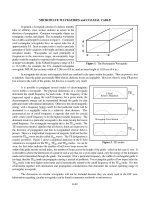Tài liệu Identifying RAM and RAM Sockets ppt
Bạn đang xem bản rút gọn của tài liệu. Xem và tải ngay bản đầy đủ của tài liệu tại đây (11.92 KB, 3 trang )
1 - 3 IT Essentials I v2.0 - Lab 2.3.7 Copyright 2002, Cisco Systems, Inc.
Lab 2.3.7: Identifying RAM and RAM Sockets
Estimated time: 40 Minutes
Objective
This lab will focus on the identification of various types of Random Access Memory
(RAM) and RAM sockets.
Equipment
The following equipment is required for this exercise:
• A functioning computer system with two DIMMS installed and the proper tools to
remove the computer cover
• Manual for the motherboard used in the computer
• (Optional) RAM Tester. If unsure of the operation of the RAM tester, ask the
instructor for further instruction.
Scenario
Fred would like to upgrade the amount of RAM in his PC, but he is not sure how to locate
it or how to determine how much RAM is installed. Help him determine how much RAM
he has so he can figure out how much more to buy.
Procedure
Random Access Memory is memory used by the CPU to store open files and active
applications temporarily. RAM is volatile, meaning that any information stored in it is lost
when the system is powered-down. RAM comes in small expansion board forms with
varying numbers of edge connectors. The RAM boards (also called sticks) are made in
30, 72, 168, or 184 pin configurations. They are referred to as SIMMs or DIMMs,
depending on the chip density. Many times, the only information to be gained visually is
the manufacturer’s name. This is why a quality RAM tester is a critical piece of diagnostic
equipment for PC repair shops.
Observe proper care concerning power supplies and ESD
Step 1
Boot the system and record the POST amount of RAM.
_______________________
Step 2
Shut down the system and follow all the safety steps in removing the computer’s cover.
2 - 3 IT Essentials I v2.0 - Lab 2.3.7 Copyright 2002, Cisco Systems, Inc.
Step 3
After gaining access to the motherboard, note the position of the RAM slots and whether
they are in use, making notes in the journal.
SLOT TYPE:
TOTAL NUMBER OF SLOTS:
NUMBER OF SLOTS OPEN:
TOTAL RAM CAPACITY
Step 4
Record the information about the installed RAM sticks in the table below.
MANUFACTURER:
TYPE:
CAPACITY: (each)
SPEED:
TOTAL CAPACITY INSTALLED:
POSITION:
Step 5
Refer to the motherboard manual or search the Internet for the type and range of RAM
chips that can be installed on this computer.
Step 6
If there are two sticks of RAM installed, remove one of the RAM sticks, noting the location
and orientation of the stick.
Step 7
Put the cover of the computer back on the computer and plug in the power cords. Restart
the computer system. Note the POST-test RAM amount.
________________
Step 8
Shut down the system and follow all the safety steps in removing the computer cover.
Step 9
Reinstall the RAM stick that was removed in Step 6.
Step 10
Put the cover of the computer back on the computer and plug in the power cords. Restart
the computer system. Note the POST-test RAM amount.
________________
Step 11
Reflect in the journal about any special considerations to be aware of as the RAM
memory is installed.
3 - 3 IT Essentials I v2.0 - Lab 2.3.7 Copyright 2002, Cisco Systems, Inc.
Attach copies of any additional research material used in completing this worksheet
before handing in this assignment.
Troubleshooting
Take extreme caution when working with RAM. ESD is one of the most common
problems when working on computers. Make sure to have an antistatic wrist strap on at
all times, and make sure to be properly grounded. The chips on a RAM module are built
for 3.3 volts. If a static discharge is large enough to see a spark, it is 3000 volts.
Reflection
Was an antistatic wrist strap use while working with RAM modules?
__________________________________________________________________
What other types of RAM are there besides the type installed in the PC worked on?
__________________________________________________________________









